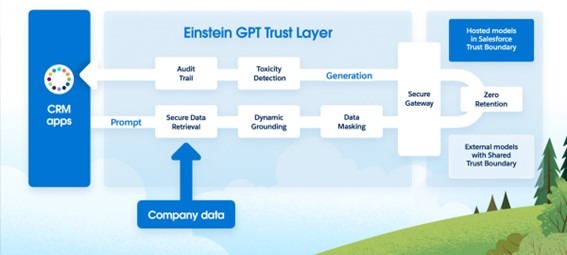Einstein GPT was the star of Salesforce’s
event of the year. Is the hype worth it?
In March 2023, Salesforce announced Einstein GPT as the world’s first ever Generative AI for use within CMR. A few months later, Salesforce announced Einstein 1, a platform built upon Einstein GPT. Fast forward to Salesforce Spring ’24 even and now the time has come for Einstein Copilot, an AI assistant embedded directly within the platform, to shine. So, what is exactly Einstein GPT and why is it promising to revolutionise customer relationships across industries?
What is Einstein GPT?
Einstein GPT is Salesforce’s large language model (LLM) chatbot. Einstein GPT is integrated with Salesforce Einstein 1, and it is built over OpenAI’s language model – albeit customised with Salesforce’s proprietary data and business expertise.
Trained on massive datasets of text and code, Einstein GPT can generate human-like text, translate languages, create creative content, and answer questions from simple or complex prompts. Furthermore, Einstein GPT can help automate tasks, provide customer support, and personalise customer experiences within the CRM platform.
What does Einstein GPT include?
Einstein GPT is included in the Einstein 1 environment, and Copilot gives it a user-friendly interface, making it easy and intuitive to use, even for users with little to no AI experience. Under the hood, Einstein GPT includes:
- A natural language processing (NLP) engine which allows the chatbot to process natural language prompts and generate natural language content;
- A powerful API which makes it very simple to integrate Einstein GPT with other systems and across the cloud;
- A machine learning (ML) engine which allows it to learn from data inputs and adjust its performance;
- Built-in translating capacities;
- A knowledge graph that stores information about customers, sales, or prices, and helps the chatbot generate more accurate and relevant responses.
What is the purpose of Einstein GPT?
As a part of Salesforce Einstein 1, Einstein GPT helps businesses leverage AI to their benefit, mainly for:
- Increased efficiency and productivity: Einstein GPT can automate tasks such as generating reports, answering customer questions, and creating marketing copy. This can free up employees to focus on more strategic and creative work.
- Bespoke customer experiences: Einstein GPT can improve customer experiences by generating personalised recommendations for products or services and providing tailored customer support.
- Creative content generation: Salesforce’s AI can be used to generate creative content such as blog posts, articles, and social media copy, saving businesses time and money on content creation. With the help of machine learning and sentiment analysis, Einstein GPT can also “read” the brand’s communication style and adapt it to the target public.
- Seamless CRM integration: You can generate emails, reports, summaries, access and analyse customer data, refine sales pipelines, and automate workflows, without switching between separate systems. This also reduces the opportunity for errors.
- Valuable data insights for decision makers: with ML capabilities and an NPL engine, Einstein GPT can pull customer data, communication patterns, and sales info from the CRM in order to produce reports, summaries, or insights in accessible language. These insights can help improve customer segmentation, targeting, or overall CRM effectiveness.
How to use?
Einstein GPT can be used in a variety of ways. Here are a few examples:
- Sales: allows Einstein GPT to amplify the Sales Cloud by composing sales-related emails, scheduling meetings with clients, preparing scenarios for next steps and interactions down the sales pipeline, leaving you or other employees hands-free to focus on closing deals.
- Service: Einstein GPT can generate quick and friendly chat replies for your customers’ queries, attentive follow-up emails, and analyse past case notes to create drafts for new knowledge base articles, which will in turn ensure your knowledge base stays up-to-date and make your reps’ lives easier.
- Marketing: produce targeted email content with product recommendations and offers tailored to your customers’ interests based on their purchase history, landing pages with relevant campaign messaging and visuals, engaging blog and social media posts, among many others time-saving features within the Marketing Cloud.
- Slack Customer 360: Einstein GPT can turn your Slack channels into a hub for communication within your teams. Simply ask Einstein GPT and you can have a smart summary about a customer or a sale delivered directly in your Slack workspace in seconds.
- Developers: simply describe the functionality you need in a natural language and Einstein GPT will translate it into a working code. It can also clean your code, suggest improvements, find bugs, create documentation and find trouble areas.
Is Einstein GPT secure?
If you are worried about data security and privacy: we get it. The AI era brings questions and concerns to businesses dealing with sensitive data. And that is exactly where Einstein GPT Trust Layer comes in. Salesforce built this Trust Layer to act as a safety net operating behind the scenes to safeguard your business’ access and control over its data.

First, Einstein GPT never stores the data it accesses, like emails, private info, reports, and others. Instead, the Trust Layer employs several different techniques, such as:
- Secure Data Retrieval: to ensure only authorised personnel access sensitive data, the secure data retrieval method uses multi-layered authentication processes and stringent access controls to pull data from Salesforce.
- Dynamic Grounding: this technique is more or less of a fact-checker, in the sense that it compares outputs against real-time information and past data. Dynamic Grounding helps Einstein GPT’s outputs to be grounded in reality – facts – promoting reliable and trustworthy content.
- Data Masking: this technique intentionally obfuscates private info that isn’t strictly necessary for the task at hand, by replacing it with placeholder values. Users can also select what to mask and what to unmask and under which conditions.
- Zero Retention: customer data is not stored outside of Salesforce nor retained by third-party LLMs for data training. Once Einstein GPT processes your prompt and generates a response, both prompt and response are forgotten.
- Toxicity Detection: this feature analyses the content generated by Einstein GPT for offensive or harmful language, proactively detecting toxic outputs.
- Audit Trail: everything that goes through Einstein GPT, prompts, responses, and trust signals, are logged and stored in the Data Cloud making the interactions auditable, monitorable, verifiable, and transparent. This enables the identification of possible issues or biases but also facilitates compliance with regulatory requirements.
Case study: how Blink Payment transformed customer support with Salesforce Einstein
Blink Payment is a fintech company specializing in processing commercial transactions. It acts as a payment gateway for businesses, allowing them to accept card payments online, in person, or over the phone with a debit or credit card. Despite the advanced technology, strong technical team and vast documentation, they still struggled to make customer support intuitive for their customers and their own staff. They would spend countless hours answering repeated questions, or even looking for answers that could be made available online. They also had a hard time piecing together queries in different channels, such as bots and email or social media.

Our initial approach involved migrating their existing code to more flexible low-code solutions using Salesforce Flows. We introduced an advanced Salesforce Einstein bot, seamlessly integrating it with Blink Payment’s customer portal and their WhatsApp support line. This integration fundamentally transformed customer engagement by enabling the bot to handle common inquiries swiftly and efficiently. Customers can now get immediate answers without waiting for human assistance. However, when a more complex question arises or a customer prefers speaking to a live agent, the bot can transfer the conversation to a human representative, ensuring a smooth transition.
The system is designed to manage customer expectations during high demand or after business hours. If no agents are available, the bot automatically offers to create a support case for the customer. This feature ensures that customers receive a case number promptly, keeping them informed and assured that their issue will be addressed as soon as possible.
This enhanced support system, powered by Salesforce Einstein, has significantly improved Blink Payment’s customer service experience. It ensures that every customer receives timely, accurate, and efficient support, no matter the time of day.
Transform your business with Salesforce
When the world’s leading CRM goes all in and embraces cutting-edge AI, it means AI is no longer a luxury for the few, it is a must-have for any business looking to thrive. Einstein GPT personalises experiences, streamlines workflows, strengthens relationships and offers insights for better decision-making – and it is there, at the distance of a click. Near Partner is your trusted partner to help you get the maximum potential of Salesforce and Einstein GPT. We’ll guide you and your team every step of the way, from setup to detail fine-tuning.
Get a free consultation with one of our experts. Leave your email and we’ll get back to you promptly:





